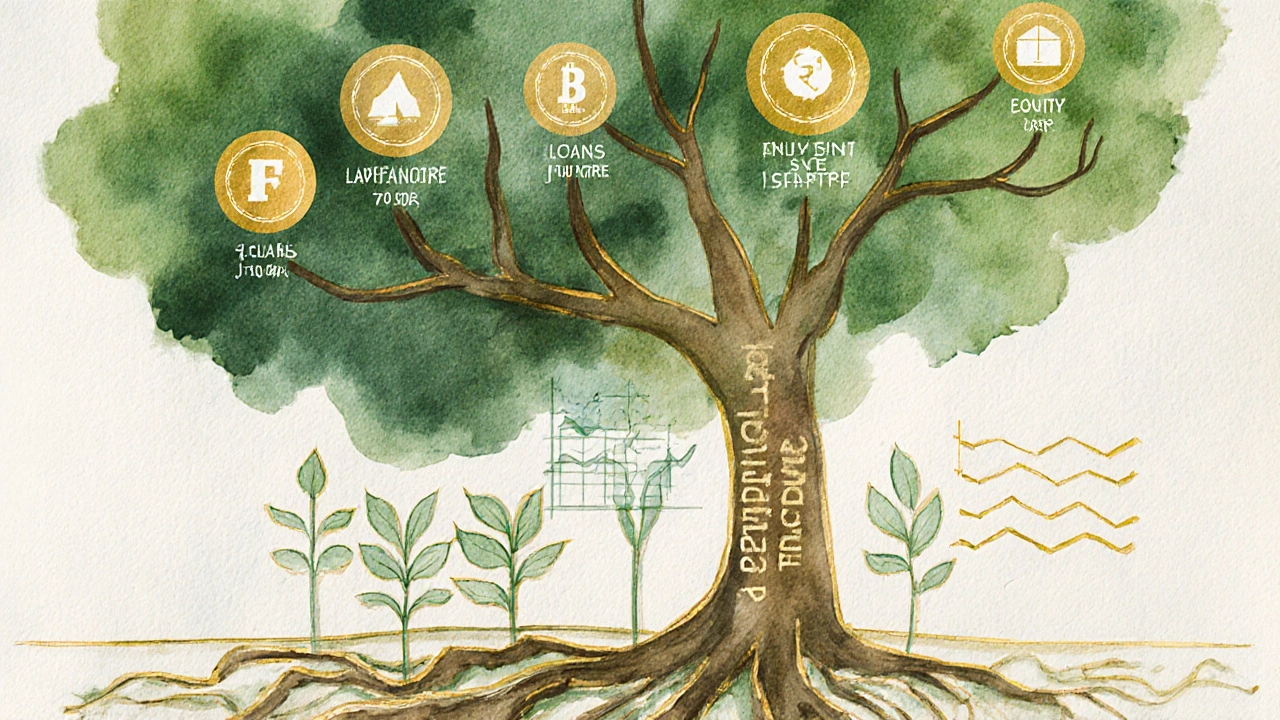Startup India Loan Calculator
Calculate Your Loan EMI
Estimate your monthly payment based on Startup India loan schemes (CGTMSE, PMMY)
Loan Results
Enter loan details to see your EMI calculation
Important Notes
- Collateral-Free CGTMSE offers collateral-free loans up to ₹2 crore
- Interest Range Typical interest rate: 7-12% depending on bank and credit profile
- Eligibility Must be DPIIT-recognized startup with valid business plan
Many entrepreneurs in India hear about the Startup India scheme and immediately wonder: how much money can I actually get? The answer isn’t simple because there’s no single loan amount tied to the scheme. Startup India doesn’t hand out direct loans like a bank. Instead, it creates pathways for startups to access funding through other government-backed programs, banks, and financial institutions.
Startup India Doesn’t Give Loans Directly
It’s a common misunderstanding. People think Startup India is a fund that gives out cash grants or loans. It’s not. The scheme is a platform - a set of policies, incentives, and partnerships designed to make it easier for startups to grow. Think of it like a traffic light system: it doesn’t drive your car, but it clears the way so you can move faster.
What Startup India does is:
- Helps startups get recognized by the government
- Offers tax exemptions for three years
- Reduces compliance burden
- Connects startups with funding partners
Once you’re officially recognized under Startup India, you become eligible to apply for loans through partner banks and financial institutions that have special programs for startups.
How Much Can You Borrow Through Partner Banks?
The real funding comes from banks like SIDBI, SBI, HDFC, and others that have partnered with Startup India. These banks offer loans under the Credit Guarantee Fund Trust for Micro and Small Enterprises (CGTMSE) scheme.
Under CGTMSE, eligible startups can get loans up to ₹5 crore (about $60,000 USD). But here’s the catch: you don’t need to put up collateral. That’s huge. Most traditional lenders require property or assets as security. CGTMSE removes that barrier for startups that don’t have physical assets yet.
Here’s what you need to know:
- Maximum loan amount: ₹5 crore
- Collateral-free: Yes, for loans up to ₹2 crore
- Interest rates: Typically 7%-12%, depending on the bank and your credit profile
- Repayment tenure: Up to 7 years
For example, a fintech startup in Pune got ₹1.8 crore in 2024 through SBI under this program. They used it to build their app, hire engineers, and get their first 10,000 users. No property was pledged. No personal guarantees were required beyond the founders’ business plan.
What If You Need Less Than ₹2 Crore?
If you’re in the early stage - maybe you’re just launching your MVP - you might be looking at ₹50 lakh or less. That’s where the Pradhan Mantri Mudra Yojana (PMMY) comes in. While not part of Startup India directly, many small startups use it because it’s simple and fast.
PMMY offers three loan categories:
- Shishu: Up to ₹5 lakh
- Kishore: ₹5 lakh to ₹50 lakh
- Tarun: ₹50 lakh to ₹10 lakh
These loans are available through microfinance institutions, NBFCs, and even some banks. Approval can happen in under 72 hours if your documents are in order. Many Startup India-recognized startups use PMMY for initial working capital.

What Are the Eligibility Requirements?
You can’t just walk into a bank and ask for ₹5 crore. You need to meet specific criteria:
- Your startup must be registered with the Department for Promotion of Industry and Internal Trade (DPIIT) under Startup India
- You must have a valid business plan with clear revenue projections
- Your business should be less than 10 years old
- Annual turnover must be under ₹100 crore
- You must be using innovation, technology, or intellectual property in your product or service
One founder in Jaipur applied twice. First time, she was rejected because her business plan was too vague. Second time, she included market research data, customer interviews, and a 12-month cash flow forecast. She got ₹3 crore in 18 days.
What About Grants and Equity Funding?
Loans aren’t the only option. Startup India also supports grant programs. For example:
- Startup India Seed Fund Scheme (SISFS): Provides up to ₹20 lakh as a grant (not a loan) for proof-of-concept, prototype development, or market entry. No repayment needed.
- Atal Innovation Mission: Offers funding for tech-based startups through incubators.
Equity funding is also common. Angel investors and venture capital firms often look for DPIIT-recognized startups because they’re seen as more credible. Some VCs even offer faster funding to these startups.
What’s the Realistic Range Most Startups Get?
Based on data from SIDBI and DPIIT reports from 2024:
- 72% of funded startups received between ₹5 lakh and ₹2 crore
- 18% received between ₹2 crore and ₹5 crore
- Only 10% received more than ₹5 crore
Most early-stage startups get ₹10-50 lakh. That’s enough to build a team, develop a product, and get initial traction. You don’t need millions to start. You need a solid plan and the right paperwork.

Common Mistakes That Kill Your Loan Application
Many startups get rejected not because they’re not good - but because they make avoidable errors:
- Applying before getting DPIIT recognition
- Submitting a vague or copied business plan
- Not showing how the money will be used
- Forgetting to include financial projections
- Applying to the wrong bank or institution
One founder in Bengaluru spent three months chasing a ₹1 crore loan. He didn’t realize he needed to first register with DPIIT. He finally did - and got approved in 11 days.
How to Apply
Here’s the step-by-step process:
- Register your startup on the Startup India portal (startupindia.gov.in)
- Get your DPIIT recognition number (takes 3-7 days)
- Prepare a detailed business plan, financial projections, and KYC documents
- Approach a partner bank (SIDBI, SBI, HDFC, ICICI, Axis, etc.)
- Apply under CGTMSE or another startup-specific loan scheme
- Wait for approval - typically 15-30 days
Use the Startup India portal’s Funding section to find banks and NBFCs that match your stage and sector.
Final Thoughts
There’s no magic number for Startup India loans. But if you’re serious, the money is there. The average startup gets between ₹10 lakh and ₹2 crore. The key isn’t asking for more - it’s proving you can use what you get wisely.
Focus on building a real business, not just chasing cash. The government doesn’t give money to ideas. It gives money to execution.
Is there a maximum loan amount under the Startup India scheme?
Yes, the maximum loan amount available through partner banks under the CGTMSE scheme is ₹5 crore. However, this is not a direct loan from Startup India - it’s offered by banks like SBI, SIDBI, and HDFC under government-backed guarantees. Loans up to ₹2 crore are collateral-free.
Do I need to provide collateral for a Startup India loan?
No, you don’t need collateral for loans up to ₹2 crore under the CGTMSE scheme. This is one of the biggest advantages for early-stage startups without property or assets. For amounts above ₹2 crore, banks may ask for partial security, but it’s still easier than traditional business loans.
Can I get a loan if my startup is just an idea?
Not directly. You need to be officially recognized by DPIIT under Startup India, which requires a registered business with a viable product or service. An idea alone isn’t enough. You need at least a prototype, a minimum viable product, or early customer traction to qualify for funding.
What’s the difference between a grant and a loan under Startup India?
A grant, like the Startup India Seed Fund Scheme (SISFS), gives you money you don’t have to repay - up to ₹20 lakh. A loan, like those through CGTMSE, must be paid back with interest. Grants are for early-stage validation; loans are for scaling. Many startups use both: a grant first, then a loan later.
How long does it take to get approved for a Startup India loan?
If your documents are complete and you’re already DPIIT-recognized, approval typically takes 15 to 30 days. Some banks offer faster processing - as little as 7 days - if you apply through their startup-focused branches. Delays usually happen because of incomplete business plans or missing KYC documents.
Can I apply for multiple loans under different schemes?
Yes, you can. Many startups combine funding sources: a ₹10 lakh grant from SISFS, a ₹50 lakh loan from SIDBI, and a ₹20 lakh Mudra loan. Just make sure your total funding doesn’t exceed your actual business needs, and keep accurate records. Lenders will check your existing obligations before approving new loans.
